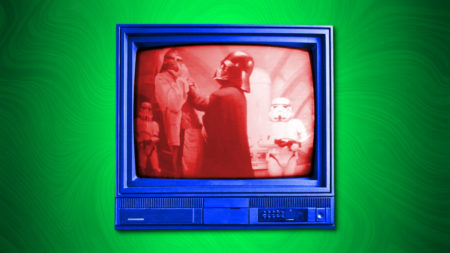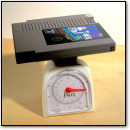
Yes, I’m new to blogging. That is, writing and running a blog. It took me a long time to warm up to the idea because I thought blogs were a load of hyper-bunk. Of course, part of me still thinks this, but I have also finally begun to realize the potential of blogs in general. It allows schmucks like me to blather on about our opinions easily on the web. Yay. Power to the loudmouths. I am fully aware, however, that one man’s opinion is another man’s BS. So don’t think I’m ever trying to lay down the final word on anything.
Now, let’s see. Why a new blog? Because I wanted to chronicle my meager collecting/playing/restoring exploits in the world of electronic and computing entertainment. ‘Electronic and computing entertainment,’ to me, means anything that entertains me that uses electronics, or anything that computes. The only non-electronic things I might talk about here are old mechanical calculators and typewriters. Why mechanical calculators? Because they are the forerunners to electronic computers. Why typewriters? Because their interface became the standard upon which computer interfaces for the last 40 years have been based (Teletypes, keyboards, terminals, etc.). So they are related to the computing end of things here. It should be noted that I have a huge bias toward consumer microcomputers — I’ve never been much for the esoteric elitism that permeates the “big iron” computer collecting community. Then there’s the gaming end of things. I’m interested in really any video game systems ever produced, but tend to focus on ‘vintage’ ones, which are usually at least five years old, or already out of production. This includes restoring, modifying, collecting, and playing games, systems, accessories, and emulators.
Now a little background on me. I have been collecting computers and video game systems for 12 years, since I was 12 years old. I am currently 24. Thus, my interest predates the current “retro” craze by a sizable margin. When I started collecting, it seemed that nobody could understand why I would want to save obsolete and seemingly useless computers and game systems. But I had a historical mindset even as a twelve year old, and figured if everybody was throwing out their old computers thinking they’re worthless, that eventually history would hurt for it. I didn’t want history to be lost. I believe we are in the middle of the most important and exciting transition in human history, where humans fully embrace and integrate computers into their lives, changing the way we live, work, and play forever. So it will be important in the future to be able to look back and see how we got there. And I, in my own small way, want to contribute to that effort.
As far as video games go, I was always buying last-generation’s games at rock-bottom prices, scouring the clearance isle at Toys ‘R’ Us and Wal-Mart for $5 NES Advantages and controllers, $10 sealed NES games, $1 official cleaning kits, miscellaneous accessories, $20 new Virtual Boys, $30 new Sega 32x’s, $10 Tiger Game.coms. The list is endless. The clearance aisle is where it’s at, as long as you have the patience to wait, and the tenacity to keep checking until stuff shows up there. I also frequented used game stores, flea markets, ham fests, yard sales, Goodwill and thrift stores, always looking for cheap games (and computers). As a result, I’ve never really been on the cutting edge of video gaming, but then again, I never really had the money to do so either. Why not wait another year until the system you want is $100 cheaper? Or five years when it’s $200 or more cheaper? That brings me to another issue which I will post about in another entry soon, about electronic devices rapidly losing monetary value.
And here’s some other relevant history. I have been using electronic communication all my life. First, and most obviously, I used a telephone. Then I used telephone lines to call BBSes for over 7 years (I also ran a successful 24-hour BBS for over five years, 1992-1998). I also dabbled in Prodigy, AOL, and Compuserve (my favorite, on there for 8 years). Then, around 1993 or 94 I called up a local university’s free dial-up line for the first time and discovered the then-primitive Internet (compared to what we have today, anyway). The World-Wide-Web (does anybody call it that anymore?) to us then was manifested in Lynx, the popular text-only web browser, and seemed pretty worthless. ‘Gopher’ from U. Minnesota was all the rage instead. My BBSing friend and I then discovered the world of MUSHes and MUDs in 1994, and completely abused the free dial-up lines, tying them up all hours of the day, staying on up to 15 hours at a time coding, talking, playing, and just having a great time. I started running my own MUSH rather late (in 2000) and it still runs to this day. Then came ISPs: Nandonet in late 94 or early 95 — a local ISP run by a newspaper, later bought by Mindspring. But my family and some friends jumped ship to a smaller ISP called Ipass instead. Then the graphical WWW showed up, which was incredible, but incredibly hard to configure with Mosaic 1.0 and Winsock crap on Windows 3.1. Also, on Compuserve I got started with a new graphical multi-user chat environment called WorldsAway in 1995 (Beta tested it for the web in 97, then finally quit in 2001). Then came my first website in 1995, complete with my first paid web hosting experience at Hurricane Electric (I think they’re still around). Back then I actually had a site that was popular in the fledgling Yahoo directory just because it had a few pictures and some cool links to other sites. Ah, what heady days. Then came Ultima Online in 1997, which I only recently quit this year. I also was on Active Worlds for over five years, a buildable online multi-user 3D chat world. And so and and so forth. I really am also interested in the history of computer telecommunications and virtual communities, so I might make a page on that too before long.
Anyway, I guess that’s enough for now. I hope you’ll stick around, Invisible Reader, read some exploits, and post some comments. I can’t promise incredibly regular updates, but when I do, they’ll probably be good.
Bye for now,
RedWolf
 Greetings, fellow retro tech fans. 20 years ago today, I launched Vintage Computing and Gaming. The origins of the site have been well-covered elsewhere, so I’ll spare you the rehash.
Greetings, fellow retro tech fans. 20 years ago today, I launched Vintage Computing and Gaming. The origins of the site have been well-covered elsewhere, so I’ll spare you the rehash.









